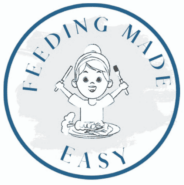You may have heard that you should limit sodium intake for babies. But what does that actually mean? Will 1 french fry do permanent damage? (no) Sodium is a nutrient that we all need, but salt tends to be in so many unexpected places. It’s more common to over-consume it.
This post may contain affiliate links and when you click on the links I may earn a small commission at no charge to you. As an Amazon affiliate, I earn a commission from qualifying purchases.
What does sodium do?
Our bodies NEED sodium to function. It’s used in nerve impulses, to contract and relax muscles, and maintain our fluid balance. Our kidneys are very important in regulating our sodium balance, but babies have immature kidneys. This is the main concern of very high levels of sodium for babies. It could put too much stress on their kidneys.
That being said, a little extra sodium now and then will probably not do irreparable harm. As with all things parenting, I generally recommend to be mindful of the sodium, but I don’t recommend tracking everything or stressing too much about it.
Another concern with salt intake is that your baby may develop a taste for very salty foods. Taste preferences are being developed in those first few years and if your baby gets used to very salty foods, they may find other foods quite bland. This could lead to excess sodium intake all through life.
Recommended Intakes
Currently we don’t have enough research to establish a Recommended Dietary Allowance, so we have an Adequate Intake (AI) for sodium. The AI is the estimated intake assumed to be adequate in healthy individuals. For sodium, the AIs are:
| Age | Adequate Intake for Sodium(1) |
|---|---|
| 0-6 months | 110 mg |
| 7-12 months | 370 mg |
| 1-3 years | 800 mg |
| 4-8 years | 1000 mg |
The AI for 0-6 months is based on the amount of sodium a baby would be receiving via breast milk. Formula companies will replicate this. The nutrients in breast milk will vary from person to person and from feed to feed, but it is estimated that breast milk has about 5 mg sodium/ounce.
Hyponatremia (too little salt)
Hyponatremia is when there is too little salt in your blood. It is not common in kids under normal circumstances. One way kids will end up with hyponatremia is with improperly mixed formula. If you add too much water to your formula, hyponatremia can occur.
Hyponatremia can also occur in situations of chronic severe vomiting or diarrhea, such as Food Protein Induced Enterocolitis (FPIES) before diagnosis. If your child is having severe vomiting or diarrhea, talk with your doctor to see if electrolyte replacements are appropriate.
Signs and Symptoms
Common signs and symptoms of hyponatremia include nausea and vomiting, headache, confusion, loss of energy and fatigue, restlessness and irritability, muscle weakness or cramps, and seizures.
Common Sources of Sodium
Sodium is both naturally occurring and added to foods. In general, the more convenient a food is, the more likely there will be salt added to it. Frozen meals, restaurant meals, prepackaged meals, and canned foods all tend to be higher in sodium (plain frozen fruits and vegetables do not have added salt). You can look for lower sodium options when available or offer your baby smaller portions or an alternate choice.
Breads, cheeses, and many sauces will contain a lot of salt. One thing to keep in mind is the portion your child will be eating. Many babies aren’t eating an entire slice of bread (while many eat several). If your baby eats smaller portions naturally, they will not be getting as much sodium.
So how worried should you be?
Be aware that many foods contain sodium, but don’t stress too much about it. When you can opt for a lower sodium option, do so. You can rinse many canned foods to lower the sodium levels. Try to avoid adding additional salt when you cook at home. Know that after age 1, the AI doubles, so you can relax quite a bit.

Krystyn Parks is a Registered Dietitian and Lactation Consultant who specializes in feeding children. She has a Master’s Degree in Nutritional Science from California State University Long Beach. She is an International Board Certified Lactation Consultant and has been registered with the Commission on Dietetic Registration since 2013.
